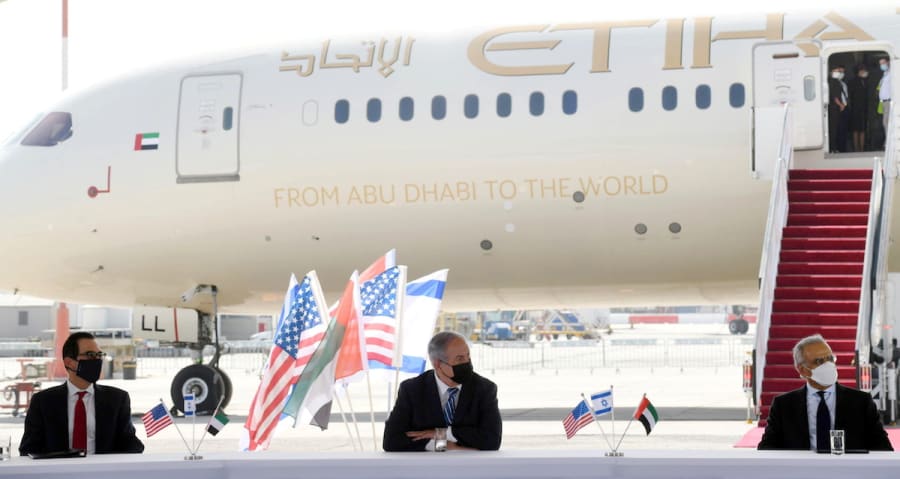Is Israel’s strict COVID approach harming UAE relations?
Israel's decision to declare the newly opened UAE a "red" country could be harming

Relations between the United Arab Emirates and Israel have developed fast since the two countries and Bahrain signed the historic Abraham Accords on Sept. 15.
However, progress in some areas of official UAE-Israel relations have reportedly slowed down in recent weeks leading some to speculate whether Israel’s approach to fighting the pandemic is undermining Jerusalem’s relations with its new Gulf partners.
In its battle against the pandemic, Israel’s Health Ministry decided on Dec. 19 to label all countries as "red," including the UAE, which had previously been one of very few states, along with the Seychelles, designated by Israel as "green," meaning Israelis returning from there would not have to quarantine for COVID upon return to Israel.
This decision came after thousands of Israelis jetted off to the UAE for their first time ever opening a new tourism market for Dubai. The sudden requirement to quarantine has effectively discouraged Israelis from traveling to the Gulf state at all until that is lifted.
An unnamed Israeli diplomatic source told The Jerusalem Post that changing the UAE from green to red has slowed down the progress in official ties between Israel and the UAE.
“At first, there was high motivation in the UAE to promote all kinds of agreements,” the source said. “Lately, they’re not pushing as much; it’s less urgent to them.”
But was Israel’s decision to designate the UAE as a "red country" justified?
While the number of daily corona cases in the UAE has recently trended upwards, they remain far below Israel’s current daily cases. With a population slightly larger than Israel’s 9.3 million residents, the UAE currently has 23,378 active virus cases.
By contrast, Israel currently has 59,229 active corona cases, more than double the number in the UAE. At the time when the UAE was designated a red country in late December, the Gulf State had approximately 1,254 daily virus cases compared to Israel’s daily 2,734 cases.
In other words, Israel had more than double the number of daily virus cases in the UAE. In addition, the number of daily cases have recently grown much faster in Israel than in the UAE. On Jan. 2, for instance, Israel recorded 6,289 cases compared to 1,963 UAE cases.
In other words, it appears that politics was a factor behind Israel’s decision to designate all destinations, including the UAE, as red. As mentioned earlier, the Gulf state lost its green status together with the Seychelles, a tiny African island state with virtually no coronavirus cases. This was likely a diplomatic move by Jerusalem to avoid singling out the UAE.
In late December, Israeli Prime Minister Benjamin Netanyahu reportedly once again postponed his visit to the UAE and Bahrain due to Israel’s ongoing lockdown further lending credence to Israeli COVID-measures as a reason for a lag in the warming relations between Israel and the UAE.
The planned visa-free travel agreement between UAE and Israel is another area where diplomatic progress has been delayed due to Israel’s strict COVID-19 policies
Officially, however, the Israeli Foreign Ministry deny that UAE-Israel ties have slowed down.
“We don’t feel anything like this. There is no sense of this on our side… We don’t feel any difference in the diplomatic activities there,” Foreign Ministry spokesman Lior Haiat told The Jerusalem Post.
Despite the current diplomatic hurdles, Israel’s Foreign Ministry remains upbeat about Israel’s future relations with the Gulf States. Israel already has a functioning diplomatic mission in Bahrain, which was operating secretly prior to the Abraham Accords. In addition, the staff for the Israeli mission in Abu Dhabi has also been selected and “in the coming weeks we will have a physical presence there,” Haiat told The Jerusalem Post.
While officials from different Israeli ministries have been tasked to deal with the UAE relations, Israel’s looming elections also appear to be a factor in temporarily bogging down ties with the Gulf States.
Another important factor is the upcoming inauguration of U.S. President-elect Joe Biden on Jan. 20. The Emirati and Bahraini governments will likely feel more at ease once the political fog in Jerusalem and Washington clears and the composition of Israel’s next government becomes known, alongside Washington’s new Middle East policies.
Meanwhile, relations in the private sector continue to grow. On Jan. 4, the UAE’s leading telecom group Etisalat announced that it will offer the Israeli i24 News channel to its customers.

The All Israel News Staff is a team of journalists in Israel.














